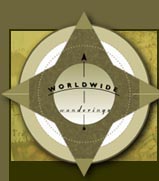|
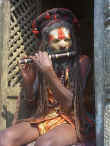 Mar. 19-22, 1999 Langtang Himal Trek I, Nepal Mar. 19-22, 1999 Langtang Himal Trek I, NepalKathmandu
to Dhunche
"Whoa now THAT was a tight one! One slight slip or wrong move, and we're all
done for . . . "
"Yeah, let's hope that our driver didn't have greasy fried chicken or
something else like that for lunch" cracks one of the Australians in the seats behind
us. Most likely out of a need to release some nervous tension, I can't stop giggling at
his silly remark.
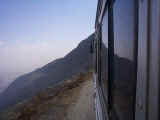 Laura on the other hand, finds it less than amusing. "It's not
funny! I just can't look" she says as she turns her head away from the window, unable
to watch as we slip around yet another blind curve, the outside back wheels of our bus
seemingly hanging off the edge of the single-lane gravel road - about 4,000 feet above the
bottom of the gorge below. Laura on the other hand, finds it less than amusing. "It's not
funny! I just can't look" she says as she turns her head away from the window, unable
to watch as we slip around yet another blind curve, the outside back wheels of our bus
seemingly hanging off the edge of the single-lane gravel road - about 4,000 feet above the
bottom of the gorge below.
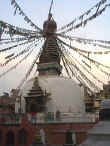 Our cliff-hugging, nail-biting, nine hour bus ride up to Dhunche
turns out to be a fitting initiation to the wild, untamed Himalayan range that we're about
to spend the next eight days trekking through. We've chosen the route known as the
Langtang trek, primarily because few others do. It's a walk scaling of over almost 6,000
vertical feet through a wide diversity of cultures, geographies, and vegetations. It
promises to be a journey of breath-taking views, breath-robbing ascents, and occasionally
I hope, a few breath-catching tea breaks. Our cliff-hugging, nail-biting, nine hour bus ride up to Dhunche
turns out to be a fitting initiation to the wild, untamed Himalayan range that we're about
to spend the next eight days trekking through. We've chosen the route known as the
Langtang trek, primarily because few others do. It's a walk scaling of over almost 6,000
vertical feet through a wide diversity of cultures, geographies, and vegetations. It
promises to be a journey of breath-taking views, breath-robbing ascents, and occasionally
I hope, a few breath-catching tea breaks.
Dhunche to Syabru Village
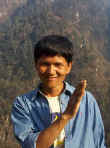 Our first day 'on the trail' begins at sunrise. Over
breakfast, we review the highlights of our route plan with Dawa, our guide. Although he
seems to understand English better than he's able to speak it, he's well versed in the
language of the mountains. It's second nature for him. It's in his blood. He's from the
Sherpa caste, a family group known world-wide for their guiding prowess on the many
ascents on Everest, as well as the Himalaya's other towering peaks. Our first day 'on the trail' begins at sunrise. Over
breakfast, we review the highlights of our route plan with Dawa, our guide. Although he
seems to understand English better than he's able to speak it, he's well versed in the
language of the mountains. It's second nature for him. It's in his blood. He's from the
Sherpa caste, a family group known world-wide for their guiding prowess on the many
ascents on Everest, as well as the Himalaya's other towering peaks.
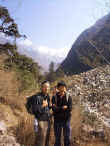 I'm still half asleep (the coffee from breakfast has yet to kick
in) when I realize that we've already made it almost ten kilometers from Dhunche - and
just by putting one foot in front of the other. Ya know, sometimes I think that's the best
way to get wherever it is you're going - to just put one foot in front of the other. Today
will prove to be a test of this theory, as tonight's destination is still hours and hours
away. I'm still half asleep (the coffee from breakfast has yet to kick
in) when I realize that we've already made it almost ten kilometers from Dhunche - and
just by putting one foot in front of the other. Ya know, sometimes I think that's the best
way to get wherever it is you're going - to just put one foot in front of the other. Today
will prove to be a test of this theory, as tonight's destination is still hours and hours
away.
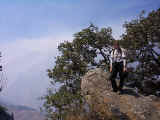 The
trail only rarely offers us the reprieve of a level stroll, but instead almost always
serves up the challenges of either a rising up, or a tumbling down, pathway (most often
times at rather precipitous angles). But helping to take our minds off of our physical
exertions, are the hosts of visual rewards in the ever-changing mountain vegetation. The
trail only rarely offers us the reprieve of a level stroll, but instead almost always
serves up the challenges of either a rising up, or a tumbling down, pathway (most often
times at rather precipitous angles). But helping to take our minds off of our physical
exertions, are the hosts of visual rewards in the ever-changing mountain vegetation.
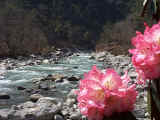 Most expressive are the twisted and
contorted Rhododenron screaming 'look at me, over here' with their exploding blooms of
red, white, and pink. Serving as both a complement and a contrast, are the straight and
stately pines, shooting high above the other trees, almost bragging about their resiliency
through this, as well as each of the other three seasons. Most expressive are the twisted and
contorted Rhododenron screaming 'look at me, over here' with their exploding blooms of
red, white, and pink. Serving as both a complement and a contrast, are the straight and
stately pines, shooting high above the other trees, almost bragging about their resiliency
through this, as well as each of the other three seasons.
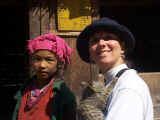 We
take a welcomed break at a small 'tea house' for lunch. 'Tea house' is a general term for
an expanded farmhouse, always with a few tables and serving meals cooked in the family
kitchen. Sometimes with a few tiny rooms of sorts with wooden platforms and thin
mattresses offering rest for weary trekkers. As I ponder my selection of Nepalese mountain
delicacies, I remember the good advice I'd gotten from our guide's T-shirt just earlier
that day. We
take a welcomed break at a small 'tea house' for lunch. 'Tea house' is a general term for
an expanded farmhouse, always with a few tables and serving meals cooked in the family
kitchen. Sometimes with a few tiny rooms of sorts with wooden platforms and thin
mattresses offering rest for weary trekkers. As I ponder my selection of Nepalese mountain
delicacies, I remember the good advice I'd gotten from our guide's T-shirt just earlier
that day.
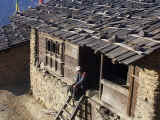 'Dal Bhat My Life' it proudly proclaimed to the rest of
the world. A Nepalese staple, dal bhat is large plate with generous servings of rice,
lentil soup and seasoned boiled potatoes, and sometimes greens, served hot and constantly
replenished until you beg your hosts to stop. It’s loaded with starches and carbos.
From what I'd seen so far, that's all Dawa ate, and if it works for him, It works for me.
"I'll have the dal bhat please." 'Dal Bhat My Life' it proudly proclaimed to the rest of
the world. A Nepalese staple, dal bhat is large plate with generous servings of rice,
lentil soup and seasoned boiled potatoes, and sometimes greens, served hot and constantly
replenished until you beg your hosts to stop. It’s loaded with starches and carbos.
From what I'd seen so far, that's all Dawa ate, and if it works for him, It works for me.
"I'll have the dal bhat please."
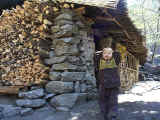 Our attention's drawn by mischievous giggles from a teenage boy on
the stoop behind us. He's entertaining himself by using a broken, dirty mirror to
playfully reflect sun into his aunt's eyes as she does the laundry about 30 feet away.
This little game continues through her soaping and rinsing, soaping and rinsing, until she
finally tires of the pesky little light in her face. Without warning, she abruptly drops
the laundry, picks up a rock, and chases her nephew, dust kicking up behind her bare
heels, across the lot and through the family's small two room house. We didn't see what
happened next, but the aunt soon reappears to finish her chores in peace. Our attention's drawn by mischievous giggles from a teenage boy on
the stoop behind us. He's entertaining himself by using a broken, dirty mirror to
playfully reflect sun into his aunt's eyes as she does the laundry about 30 feet away.
This little game continues through her soaping and rinsing, soaping and rinsing, until she
finally tires of the pesky little light in her face. Without warning, she abruptly drops
the laundry, picks up a rock, and chases her nephew, dust kicking up behind her bare
heels, across the lot and through the family's small two room house. We didn't see what
happened next, but the aunt soon reappears to finish her chores in peace.
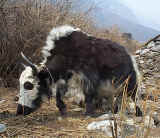 O.K.,
time to get crackin' - back on the trail. Looking down to assure our steps are solid ones
(and to avoid the ever present and slippery piles of yak dung) we notice the midday sun
reflecting off of the bits of silver mica in the dusty soil, making it sparkle under our
feet. The sounds of an occasional gushing waterfall, ringing yakbell, or baaaing sheep
break the silence of our thoughts. The day drifts on and the mountains and surrounding
valley begin to take on a surreal, almost heavenly appearance. The season's thick, heavy
air, combined with smoke from the farmers burning of their crop stubs, creates a light,
hazy blurring by mid-afternoon. O.K.,
time to get crackin' - back on the trail. Looking down to assure our steps are solid ones
(and to avoid the ever present and slippery piles of yak dung) we notice the midday sun
reflecting off of the bits of silver mica in the dusty soil, making it sparkle under our
feet. The sounds of an occasional gushing waterfall, ringing yakbell, or baaaing sheep
break the silence of our thoughts. The day drifts on and the mountains and surrounding
valley begin to take on a surreal, almost heavenly appearance. The season's thick, heavy
air, combined with smoke from the farmers burning of their crop stubs, creates a light,
hazy blurring by mid-afternoon.
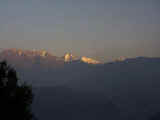 At
this point in the day, the majority of our steps are upward. Upward and over increasingly
rocky terrain. Some stretches of the trail have fallen away from the mountainside and
collapsed in a tri-angling cascade of dirt, pebbles, rocks, and boulders. Other sections
have been covered by rockslides and landslides from above. We look across the gorge at one
whole section of the mountain that has completely fallen away, leaving two new peaks on
each side of what was once a ridge. Laura asks Dawa about earthquakes. "Yes,
sometime" he replies, obviously hoping to end the conversation at that. We agree, and
let his last words just hang there as we all keep walking in silence. At
this point in the day, the majority of our steps are upward. Upward and over increasingly
rocky terrain. Some stretches of the trail have fallen away from the mountainside and
collapsed in a tri-angling cascade of dirt, pebbles, rocks, and boulders. Other sections
have been covered by rockslides and landslides from above. We look across the gorge at one
whole section of the mountain that has completely fallen away, leaving two new peaks on
each side of what was once a ridge. Laura asks Dawa about earthquakes. "Yes,
sometime" he replies, obviously hoping to end the conversation at that. We agree, and
let his last words just hang there as we all keep walking in silence.
|
